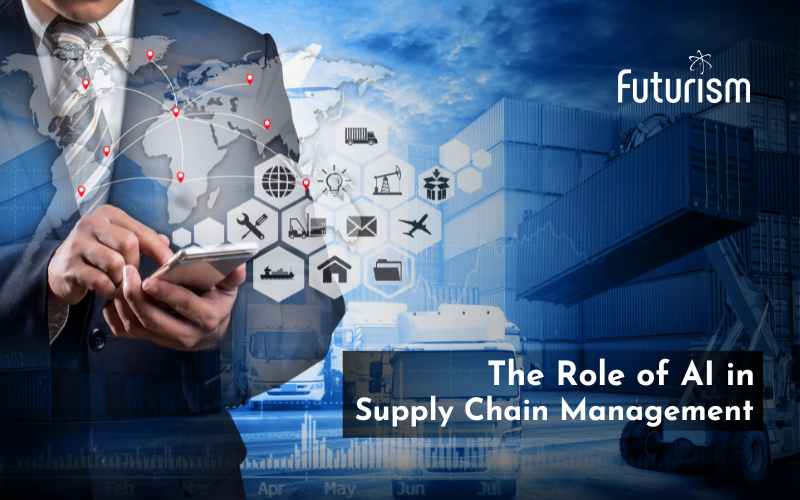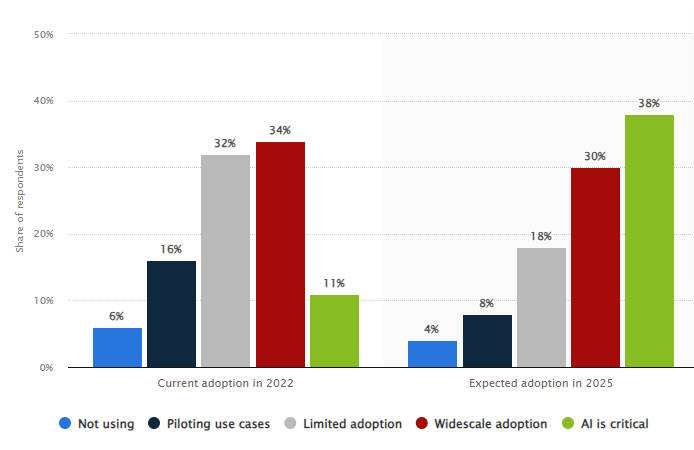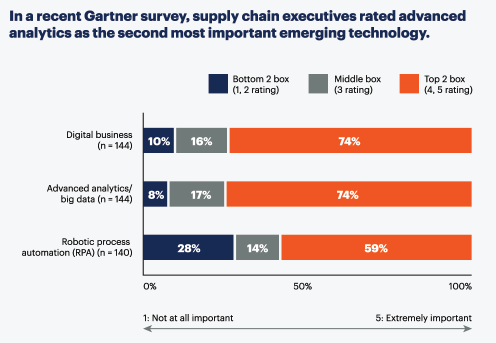The Role of AI in Supply Chain Management: A Futurism Advisory

Futurism Technologies
July 24, 2023 - 3.2K
5 Min Read
Introduction
In the aftermath of the global pandemic, several industries are grappling with the challenges of recovery. However, some sectors, such as the supply chain, have seized the opportunity to embrace cutting-edge technologies on a grand scale. Artificial Intelligence (AI) stands out among these technologies, with its potential to transform processes, decision-making, and overall efficiency.
According to Statista, the application of AI in supply chain management has led to improvements in inventory management, demand forecasting, smart manufacturing, dynamic logistic systems, and real-time delivery controls. This has spurred its widespread adoption. The primary goal of integrating AI in supply chain management and logistics is to enhance efficiency and productivity. This has resulted in more sustainable operations, prompting enterprises to get their heads into digital transformation to revolutionize their supply chain businesses.

Image Source: Statista
A recent study by McKinsey revealed that the implementation of AI in logistics and supply chain management has led to significant improvements. This underscores the potential of AI-driven logistics optimization and supply chain management to revolutionize the industry and its importance in the contemporary business landscape. This article aims to provide a comprehensive understanding of what AI and intelligent data analytics in the supply chain can do for your business.
The Impact of AI on Supply Chain Businesses
AI’s impact on supply chain businesses is profound. It brings together the workforce, machines, and software into action, creating a more efficient and productive environment. Let’s delve deeper into the role of data analytics in supply chain management and how AI can be integrated into your enterprise.
The Role of Data Analytics in Supply Chain Management
The use of AI in supply chain management, through advanced algorithms and machine learning techniques, allows businesses to extract valuable insights that aid in informed decision-making. Enterprises that leverage predictive analytics in supply chain can aim to make their supply chain business more:
- Instrumented: Machine-generated data flows from IoT devices.
- Intelligent: More accurate and competent assumptions are made with the help of data analytics and modeling.
- Interconnected: Extensive connectivity allows for better decision-making.
Read also: When AI Meets IoT?
Predictive analytics in supply chain optimize the workflow, where large amounts of data can provide forecasting, identify inefficiencies, and drive innovation. Here are some top examples of supply chain data analytics:
Predictive Analytics
Predictive analytics leverages the power of statistical modeling and regression analysis to identify and understand trends from historical data to make predictions about future trends. This helps supply chain companies predict the most likely future outcome and its business implications, such as using predictive analytics to mitigate risks and disruptions.
Descriptive Analytics
Descriptive supply chain analytics is a form of data mining that involves the analysis of large datasets to identify patterns and generate summaries that allow users to gain insight into a given situation. This type of analytics utilizes historical data to uncover trends and draw conclusions that can be used for informed decision-making. Descriptive analytics provides visibility and certainty to all kinds of internal and external data across supply chain management.

Prescriptive Analytics
Prescriptive analytics is a powerful tool for supply chain operations, allowing for the exploration of how specific changes will affect outcomes. Through supply chain analytics, potential improvements can be identified and recommended, providing a valuable resource for optimizing supply chain operations. This includes collaborating with logistic partners to reduce time and effort for maximum business value. One popular reference is the use of Supplier Relationship Management (SRM) as a prescriptive analytic approach.
Cognitive Analytics
Cognitive analytics is a key component of advanced analytics in supply chain management. It is best used in enhancing customer experience and relationships. The feedback data received through AI-driven logistics optimization systems is analyzed and executed in reports and dashboards to answer complex questions. This application of AI in supply chain management can automatically allow your business to pursue breakthrough ideas and provide better customer needs and demands.
Key Steps to Optimize AI and Data Analytics in the Supply Chain
The implementation journey for AI/ML in supply chain may differ based on each organization’s unique needs, available resources, and industrial environment. However, here are some of the common steps that a trusted AI solutions provider would follow to implement AI in supply chain management successfully.
Read also: 5 Must-Have Features of Modern Supply Chain Management Software
- Establish Goals
As a leading AI solutions company, we at Futurism Technologies begin with establishing the goals you hope to accomplish by integrating data analytics and AI in supply chain management. Our AI/ML experts, after discussion with the stakeholders, determine and identify areas such as demand forecasting, inventory management and optimization, route optimization, or risk management, where AI can be utilized.
- Collect and Organize Data
Next, our AI experts gather pertinent information from various sources throughout your supply chain, such as previous sales data, customer information, inventory records, logistical information, and external data sources, such as market trends and weather patterns, and organize them. This is where data science comes into play.
- Data Preparation and Cleaning
Raw data often has errors, inconsistencies, or missing values. The data must be cleansed and prepared before AI algorithms can examine it efficiently. This entails activities including eliminating duplicates, fixing mistakes, addressing missing data, and formatting the data appropriately.
- AI Algorithm Selection
In this stage, our digital transformation experts choose the right AI algorithms to address certain supply chain challenges based on the outlined objectives. Regression, classification, clustering, or deep learning methods for complicated pattern identification may be used in this case.
- Choose AI Technologies
In this stage, our AI experts would help you to choose the right set of AI tools and methods compatible with your goals and available data. This could involve identifying the right AI technologies like robotic process automation, computer vision, natural language processing, machine learning, or predictive analytics.
- Data Modelling
Data modeling is a crucial process that requires careful selection of the right set of machine learning algorithms. Our data science solutions leverage various data sources by transforming them and constructing features that can best explain the variability in the data. This means that your organization can leverage the power of algorithms such as Seq2seq machine learning and natural language processing algorithms and Auto-Encoders to generate forecasts.
- Integrate with Existing Systems
Now, our AI experts would integrate the relevant AI capabilities into the infrastructure and technologies that now run your supply chain. In order to do this, enterprise resource planning (ERP), warehouse management solution (WMS), transportation management (TMS), or other pertinent software may need to be linked with AI models. The experts would ensure that the systems’ integration is seamless and permits data transfer.
- Test and Validate
In this stage, the experts put your AI models and linked systems through thorough testing and validation. By contrasting forecasts or suggestions with actual results, you may confirm the precision, dependability, and performance of the AI algorithms. Depending on the testing outcomes, our Quality Assurance and Testing experts iterate and improve the models.
- Pilot Testing and Deployment
It is highly recommended to conduct pilot testing and deployment on a smaller scale before implementing AI solutions across the entire supply chain. This approach allows for effective evaluation of the AI system, identification of any issues or areas of improvement, and fine-tuning of the algorithms. By doing so, AI/ML experts ensure the success of AI in supply chain management, optimization and implementation. They take the necessary steps to pilot-test your AI for supply chain solution and reap the benefits of a streamlined supply chain.
- Continuous Improvement
Supply chain AI implementation is a continuous process. Evaluate how AI is changing your supply chain processes over time and make necessary changes in your AI-based supply chain management to increase productivity, accuracy, and decision-making. Keep abreast of current AI breakthroughs and look at supply chain innovation and optimization prospects.
Read also: The Ultimate Digital Transformation Checklist for Businesses in 2023 and Beyond
Top 5 AI and Analytics-Enabled Use Cases to Control Supply Chain Disruption
Forward-thinking supply chain organizations are now empowering their operations with automated supply chain analytics and data visualization solutions. Here are some use cases of AI in supply chain management to minimize the supply chain disruption and make the most out of your business.
- Demand Forecasting in Warehouse Supply and Demand Management
This data-rich modeling method is by far the best use case of data science and AI for the supply chain forecasts that empower warehouse employees to make more informed decisions on inventory stocking. This is an excellent example of artificial intelligence for inventory management.
- AI for Vehicle Maintenance Recommendations
IoT device data is generated from in-transit vehicles to deliver real-time insights on the longevity of the transport vehicles. The machine learning systems integrated into the vehicles make maintenance recommendations and failure predictions based on past data. This type of AI-driven logistics optimization will allow you to take fleeting vehicles out of the chain before the performance issue causes any kind of delay in the deliveries.
- AI in Adding Portability to Supply Chain Loading Process
Supply chain management comes with a great deal of detail-oriented analysis, including how shipments and goods are loaded and unloaded from the shipping containers. Both data modeling and AI precision are needed to determine the most efficient ways to get the goods on and off the containers. Modern supply chain companies use a combination of software, hardware, and AI-driven supply chain data analytics to get real-time visibility into the loading process. The gathered data can also be used to design less risky and quick process protocols to manage parcels.
- AI for Cost-Saving and Revenue Boost in Supply Chain
According to a Bloomberg report, the overall cost in the supply chain has reduced to 12% leading to adoption of AI in the last two years. When it comes to cost saving, AI and data analytics solutions are the most effective options to negotiate better shipping and procurement rates, pinpoint changes in the supply chain profit process and manage courier partners. You can assess a centralized database that takes virtually every aspect of the supply chain to deliver financial decision-making. In general, advanced predictive analytics in supply chain management is paving the way for innovations where platforms are used for mining and analyzing cost-effective revenue-building standards.
- Data Analytics-Based Strategic Sourcing in Supply Chain
The most underrated application of AI in supply chain management is the identification of critical suppliers and strategic partners. This helps you standardize lower-cost alternatives and predicate supply performance indicators for compliance.
Challenges in Implementing AI in Supply Chains and Solutions to Overcome Them
Integrating AI into the supply chain presents a number of challenges. Here are some typical challenges and solutions for them:
Data Quality and Availability
Challenge: For AI algorithms to produce correct findings, a significant amount of high-quality data must be made available. However, it may be difficult to effectively implement AI models due to the possibility that supply chain data is inconsistent, incomplete, or of low quality.
Solution: To increase data quality, invest in data cleaning and validation procedures. Implement data governance procedures to guarantee the accuracy and consistency of your data. To increase data availability, look into partnerships and other data sources.
Infrastructure and Technology
Challenge: Technical issues may arise when integrating AI into current supply chain systems. The seamless integration of AI in supply chain management might be hampered by outdated systems, incompatible platforms, and inadequate IT infrastructure.
Solution: Conduct a thorough technology audit to pinpoint any gaps and requirements for integrating AI. Upgrade your infrastructure and consider implementing cloud-based solutions for scalability. Collaborate with technology partners and IT teams to guarantee seamless integration and reduce disruptions.
Vendor Choice and Collaboration
Challenge: Working with external vendors, trusted AI solutions provider, or technological partners involves rigorous selection and review to ensure compatibility, dependability, and long-term partnerships.
Solution: Select reputable and trustworthy partners that offer scalable artificial intelligence consulting services by conducting in-depth research, due diligence, and vendor reviews. Ensure your requirements and expectations are crystal clear, and create effective communication routes. Maintain a feedback loop and engage in continuous communication to address any problems or issues that may come up.
By proactively addressing these issues and implementing the recommended techniques, organizations can overcome barriers to deploying AI in supply chain management and realize its promise for enhanced efficiency, decision-making, and competitiveness.
The Future of AI in Supply Chain: Predictions for 2023 and Beyond
The integration of AI in supply chain management has truly revolutionized the way businesses operate. And the exciting part is that this is just the beginning. As we look ahead to the future of AI in supply chain management, we see a world of possibilities.
With predictive analytics in supply chain, companies can now accurately forecast demand, optimize inventory levels, and improve efficiency. Autonomous vehicles and drones are taking Get in touch with our AI experts to explore and understand the benefits of AI for your supply chain business.to the next level with faster deliveries and enhanced safety measures. AI-driven robotics in warehouses are boosting productivity and reducing costs.
By embracing these advancements, businesses can drive operational efficiencies, enhance customer experiences, and gain a competitive edge in the global marketplace.
Make Your Supply Chain Future-Ready with Futurism
The benefits of AI in supply chain management are indispensable. In fact, AI is fast turning out to be a commonplace technology for the supply chain now that enterprises of every scale and size have adopted its extensive applications. Given the current scenario, every supply chain business needs to be critically integrated with supply chain AI solutions for optimization.
It’s high time for supply chain businesses to choose a trusted AI solutions provider to revolutionize their supply chain operations. We at Futurism Technologies can empower your business with coming-of-age AI solutions for supply chain management and optimization. From supply chain analytics and data visualization to data warehousing and business intelligence solutions, we can help with all.
Get in touch with our AI experts to explore and understand the benefits of AI for your supply chain business.
Subscribe Now!
TRENDING POSTS
-
What is Ransomware-as-a-Service (RaaS)? Everything You Need To Know
-
Futurism Returns to Hannover Messe 2024: Leading the Charge in Industrial and Digital Transformation
-
The Role of Smart Maritime IoT Solutions in Enhancing Maritime Safety
-
Data Integration Unlocked: From Silos to Strategy for Competitive Success
-
Navigating the Shadows: Understanding Zero-Click Attacks in the Digital Age
-
AI Reimagined: Crafting Next-Gen AI Apps with Expert Fine-Tuning
-
Explore Next-Gen Digital Solutions with Futurism at MWC 2024
-
Futurism Unleashes the Technology of Tomorrow at MWC Barcelona 2024
-
Futurism AI: Turning Ideas into Apps at Lightning-Fast Speed
-
Accelerate AI Across Your Enterprise With Futurism AI
-
Futurism to Address the Biggest Security Challenges at RSS 2022
-
Futurism at SelectUSA 2022: Steering the Next Wave of Businesses
-
Futurism to Uplift the MSP Business Community at the MSP Expo 2022
-
Futurism Sets Out to Address the Biggest Security Challenges at the RSA Conference 2022
-
5 Ways to Prepare Your Business for Digital Transformation
-
4 Ways To Win at Digital Transformation on a Shoestring Budget
-
Futurism: Empowering MSPs at the Channel Partners Conference & Expo 2022
-
Why AI in Digital Marketing is the Next Big Thing?
-
Futurism brings ‘Mobile First Digital Transformation’ to the fore at MWC Barcelona 2022
-
Cybersecurity for Rural Hospitals: How can Rural Hospitals become Cyber Smart?
-
Futurism Empowers Rural Health Care Community at the AHA Rural Health Care Leadership Conference
-
The Biggest Problem With Cybersecurity In Healthcare Sector, And How IBM QRadar Can Fix It?
-
How IBM MaaS360 is Revolutionizing Endpoint Security in the Healthcare Industry?
-
Futurism to Present its MSP Partner Program at the Channel Partners Conference & Expo 2021
-
EndPoint Security in Healthcare Matters and IBM MaaS360 Can Help
-
How AI Will Enable Faster Adaptation of Digital Transformation
-
How Is Digital Modernization Important In Supplier On-Boarding?
-
Top 10 Email Marketing Tips for This Holiday Season
-
Benefits of using ERP Software for Energy and Gas Industries
